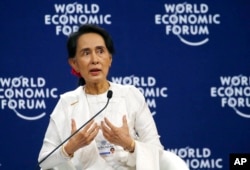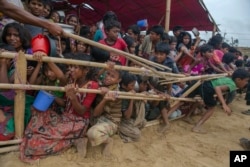A groundswell of international condemnation of Myanmar's civilian leader Aung San Suu Kyi and her government's refusal to take action on atrocities committed against Myanmar's Rohingya minority is spreading closer to home.
Nearly 700,000 ethnic Rohingya Muslims from Myanmar's Rakhine state have fled a brutal military crackdown that has seen systematic rape, mass killings and the torching of entire villages in what the U.N. has called a "textbook example of ethnic cleansing."
Member states of the Association of Southeast Asian Nations (ASEAN), who usually stand by the block's mantra of non-interference in each other's internal affairs, have now joined the chorus of outrage — calling for prosecutions of those responsible.
In a particularly pointed intervention, Malaysian Prime Minister Mahathir Mohamad told Turkish television network TRT World this week that Suu Kyi had lost his support for her role in "what appears like a genocide."
"We have not minced words about this. Although our policy in ASEAN is non-interference in the internal affairs of the country, what is happening is grossly unjust. We have voiced our opinion," he said on the sidelines of the U.N. General Assembly in New York.
Mahathir said he was very disappointed by State Councilor Suu Kyi, whom he had struggled to help free during her 15 years of house arrest when she was fighting the human rights abuses of Myanmar's military junta.
"Of course, she was eventually released, but over this [Rohingya] issue she seems a changed person. She did not want to see any action taken against the military," he said.
Suu Kyi, who was awarded the Nobel Peace Prize in 1991 for her pro-democracy fight, has refused to acknowledge the atrocities committed by the military in Rakhine state and defended her government's handling of the situation.
On Tuesday, Canada's parliament voted to strip Suu Kyi of her honorary citizenship, declaring her government's treatment of the Rohingya to be genocide.
The move came after a yearlong U.N. investigation concluded in August that six of Myanmar's top generals should be tried on charges of genocide and crimes against humanity.
'Man-made humanitarian disaster'
Singapore's Foreign Minister Vivian Balakrishnan told his parliament this week that ASEAN foreign ministers met on the sidelines of the U.N. General Assembly, where they expressed their "grave concern with these alleged acts of violence."
"To be brutally honest, this is a man-made humanitarian disaster, and something which should not be happening in this day and age," Balakrishnan said.
"If this festers, it will create more opportunities for extremism, and ultimately terrorism, which will not respect boundaries, and will represent a clear and present threat throughout Southeast Asia and beyond," he said.
Myanmar government spokesman Zaw Htay told VOA Friday, "I won't answer any questions from the media."
Rights group Amnesty International's Myanmar researcher Laura Haigh said she hoped that Balakrishnan's words marked a shift in ASEAN's stance on the issue but that words needed to be followed with actions.
"Well, I think it's really significant actually that we're starting to see the ASEAN states start to talk about the situation in Myanmar, but frankly it's a little bit too little too late at the moment," she said.
"I mean this is over a year since this crisis started and ASEAN as a block has yet to take any effective action. It hasn't even met to discuss the situation formally."
Paul Chambers, a Southeast Asia expert at Thailand's Naresuan University, said Myanmar's military was increasingly faced with cohesion in world opinion against its anti-Rohingya policies.
"But it is highly doubtful that foreign condemnation will affect Myanmar state policy. Rather, the state might use the critical words of foreigners to rally Burmans around the flag."
'Repressive legal framework'
Many of Myanmar's majority ethnic Burman Buddhists view the Muslim minority as "Bengali" invaders brought in during the time of British colonial rule and refuse to call them Rohingya, let alone acknowledge them as citizens.
Haigh said she does believe international pressure, including a referral of the atrocities to the International Criminal Court (ICC) and the establishment of a global arms embargo, could help facilitate change in Myanmar, but it had to be backed up by pressure from within the country itself, where civil society was hamstrung by sustained legal attacks.
"I absolutely do think that there are people within the country who are trying to fight for justice and accountability for what's happened, not just to the Rohingya but to other ethnic minorities in the country," she said.
"I think the problem as I say is the fact that there is such a repressive legal framework that anything they do can result in them being arrested, imprisoned and ... the threats that they can be subjected to are very real."
Reuters journalists Wa Lone and Kyaw Soe Oo, who had been investigating the execution of 10 Rohingya men and boys by security forces and local Buddhists in Rakhine state, were sentenced to seven years jail under a colonial-era Official Secrets Act in September.
In August, anti-military protester Htin Kyaw was arrested in Yangon moments after he unfurled a banner calling for the U.N. and ICC to "come quick" and arrest Myanmar's military leaders.







